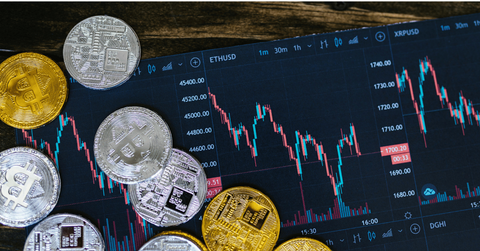Investing in Cryptocurrency: Is Ethereum Worth the Risk?

July 31 2024, Published 3:00 a.m. ET
If you're familiar with cryptocurrency, you've likely heard Ethereum mentioned. It’s nearly as synonymous with crypto as Bitcoin, the first-ever digital currency. Ethereum is generally considered the world's second most popular cryptocurrency, with the exchange rate from Ethereum to US dollar currently at 1 to $3,322.31.
When it comes to cryptocurrency there is risk involved because crypto is decentralized, meaning any one government or financial institution doesn't back it. Due to this, it needs more security and some of the legitimacy that comes with more official support. Investing in crypto like Ethereum can prove lucrative if approached carefully and with the mindset that crypto investments aren't guaranteed to pay off.
What Makes It Different?
Many cryptocurrencies overlap in several different ways. Most, for example, utilize blockchain technology, which allows the secure transfer of encrypted data to prevent counterfeiting. Ethereum and Bitcoin share this, though they differ in critical ways. Ethereum is generally considered more sophisticated than Bitcoin because its blockchain can also be used to run applications, making Ethereum an entire platform rather than just a currency.
Ethereum's currency, Ether (ETH), can still be traded or exchanged for other coins like Bitcoin. Its use-value continues growing as more online businesses and "brick-and-mortar” stores allow Ether payments.Another advantage it has over Bitcoin is that its transaction times are faster.
Purchasing and Investing With Ethereum
Like with many cryptocurrencies, you can purchase Ethereum at a crypto exchange. Before doing so, however, you'll need to open an account linked to your bank and confirm your identity and place of residence. There are fees associated with transfers (which can add up if you need to watch), often applying to withdrawals and transactions.
Your account must also have a payment method attached, including PayPal, wire transfers, credit cards, and debit cards. Given the relative complexity of setting up this information, it's generally best for new crypto investors to seek help.
Once you've set up your account, you'll be ready to buy, sell, and transfer Ether, though some additional factors remain to remember. Cryptocurrencies are inherently speculative and volatile, with Ether proving little exception.
As such, many financial advisors suggest only investing in crypto using capital you're willing to part with if it comes down to it. Ethereum's additional programmable flexibility compared to coins like Bitcoin may make it more stable, but there are no guarantees with crypto. Its decentralization also means it lacks financial institutions' support that would otherwise protect investors should a stock or bond fail.

In general, Ethereum and cryptocurrency are all relatively new, causing the financial outlook on digital currency to look like the Wild West. Like with gold and other commodities, Ether's value as an asset is only what people agree it is, so keep that in mind should you want to cash in on the project while crypto remains hot.


